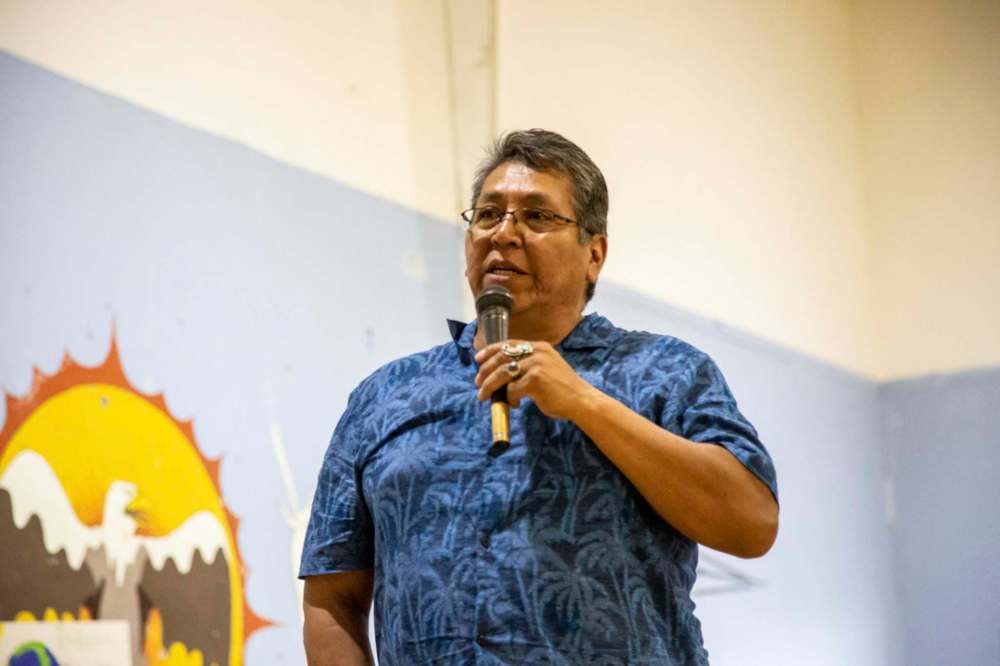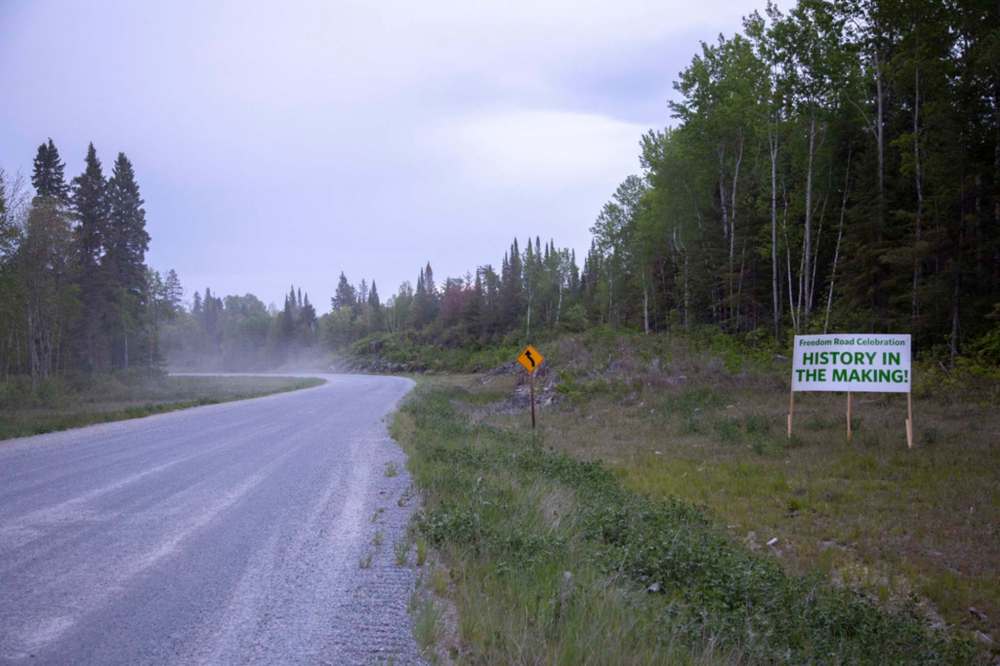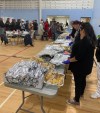First anniversary of Freedom Road brings rewards, challenges
Link to Trans-Canada Highway, now more than a year old, has brought big changes to First Nation
Advertisement
Read this article for free:
or
Already have an account? Log in here »
To continue reading, please subscribe:
Monthly Digital Subscription
$0 for the first 4 weeks*
- Enjoy unlimited reading on winnipegfreepress.com
- Read the E-Edition, our digital replica newspaper
- Access News Break, our award-winning app
- Play interactive puzzles
*No charge for 4 weeks then price increases to the regular rate of $19.00 plus GST every four weeks. Offer available to new and qualified returning subscribers only. Cancel any time.
Monthly Digital Subscription
$4.75/week*
- Enjoy unlimited reading on winnipegfreepress.com
- Read the E-Edition, our digital replica newspaper
- Access News Break, our award-winning app
- Play interactive puzzles
*Billed as $19 plus GST every four weeks. Cancel any time.
To continue reading, please subscribe:
Add Free Press access to your Brandon Sun subscription for only an additional
$1 for the first 4 weeks*
*Your next subscription payment will increase by $1.00 and you will be charged $16.99 plus GST for four weeks. After four weeks, your payment will increase to $23.99 plus GST every four weeks.
Read unlimited articles for free today:
or
Already have an account? Log in here »
Hey there, time traveller!
This article was published 13/06/2020 (1969 days ago), so information in it may no longer be current.
There isn’t a day that goes by Daryl Redsky doesn’t think about the road.
Almost every day, he’s on it, driving from his home in Shoal Lake 40 First Nation to Kenora, Ont., where he works running an after-hours mobile team that helps youth in crisis.
For years, Redsky and other Shoal Lake 40 community members fought so hard to get the road built, to tell the truth of their struggle, to get government to take action. Now, even as the tires of his truck roll over the dusty gravel, he still can’t quite believe it is real.

“It’s always been a far-fetched dream to fight for that road, and people were always telling us it’s not going to happen, and yet here we are, I’m driving on it right now,” Redsky says, calling on speakerphone. “It’s a freedom that I enjoy to be able to get up and go to work, or just go get some milk at Falcon Lake.
“We have that ability now, where we never had that before.”
It’s been little more than one year since Shoal Lake 40 celebrated the grand opening of its “Freedom Road,” a 24-km ribbon that links the First Nation, which straddles the Manitoba-Ontario border, to the Trans-Canada Highway. In the months since, life in the community has changed in a multitude of ways.
The community had been long-severed from the mainland, turned into a man-made island by the canal that supplies Winnipeg’s aqueduct. The only way in was a rickety barge in the summer or ice roads in the winter, and in the spring, when the ice first broke up, the community was often locked in.
That isolation had left the community languishing. Jobs were scarce, economic development almost non-existent; without a reliable link to the outside world, infrastructure was hard to build. It was difficult and even dangerous to cross the lake to get groceries, and the First Nation had been under a boil-water advisory for decades.
Since the road opened, the community has built five houses, band councillor Roxanne Greene says — the first new homes in two decades. It won the contract to build a long-awaited water treatment plant, which is set to be completed in 2021; the community is also preparing to build a new school to replace its cramped, dilapidated structure.
“We needed that road for us to rebuild our infrastructure,” Greene says. “It shows that things are happening. our community’s patience and resilience through all these years in waiting can finally be rewarded through housing, through clean water, through quality education in a standard setting.”
The experience community members earned in building Freedom Road is also opening new economic avenues.
In February, the province of Ontario signed a memorandum of understanding with Niiwin Wendaanimok Partnership, a group of four regional First Nations, on a project to twin parts of the Trans-Canada between eastern Manitoba and Kenora. The project will bring a variety of job opportunities to Shoal Lake 40 members.
“I get a really big satisfaction out of seeing all the development now,” Redsky says. “One of the reasons we set out to get that road was for us to enjoy the rest of the world, and have access to employment. All of that is unfolding right now even as we speak.”
There are the little things Greene notices — the things that, not so long ago, would not have been possible. The other day, a truck rolled into Shoal Lake 40, carrying soil for a community garden. That truck could never have fit on the old barge, Greene says.

Those living off-reserve come visit more than before. Some band members have moved back home, and local leadership expects there will be more. One of Greene’s neighbours takes his elderly parents to Falcon Lake each week for a burger and some ice cream, a simple treat now made possible.
There have been some challenges. The dust on the road can be severe (leadership is studying ways to keep it down). With unfettered access to the outside world, some residents worry it’s easier to bring drugs into the community.
And there is a bittersweet twist in the story, one no-one could have foreseen when Freedom Road opened: the road is currently closed to non-essential visitors. The community has been under a lockdown since March to help prevent the importation of COVID-19; a checkpoint now stands at the First Nation’s border.
“The road, at the same time, could be the death of us or the life of us,” Greene says.
Overall the community has adapted well to the pandemic, she adds, perhaps because it was accustomed to being in crisis. COVID-19 put most of the world on pause, and Shoal Lake 40 is no exception; still, one year after it celebrated the opening of its road, the First Nation is steadily moving forward.
“You don’t know what freedom of movement really means unless you’ve been in the situation where you’re totally remotely isolated,” Redsky says. “There’s a lot of work to be done, and a lot of work being done. We have a lot of catching up to do.”
melissa.martin@freepress.mb.ca

Melissa Martin
Reporter-at-large
Melissa Martin reports and opines for the Winnipeg Free Press.
Every piece of reporting Melissa produces is reviewed by an editing team before it is posted online or published in print — part of the Free Press‘s tradition, since 1872, of producing reliable independent journalism. Read more about Free Press’s history and mandate, and learn how our newsroom operates.
Our newsroom depends on a growing audience of readers to power our journalism. If you are not a paid reader, please consider becoming a subscriber.
Our newsroom depends on its audience of readers to power our journalism. Thank you for your support.


